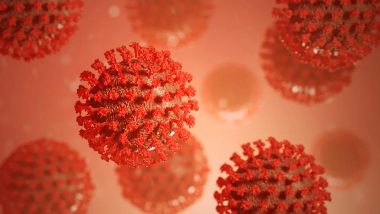London, December 8: Scientists have assessed the immune response against the novel coronavirus in over 150 COVID-19 patients and found that the antibodies found in the mucous membrane are activated much earlier than other types, an advance which may lead to the development of new vaccines against the disease.
According to the scientists, including those from Sorbonne University in Paris, the IgA antibodies found in the mucosa dominate the early response to the SARS-CoV-2 virus compared to other antibodies such as the IgM and IgG.
They said the findings, published in the journal Science Translational Medicine, are "somewhat unexpected" since IgM antibodies are usually the immune system's first responders. Vitamin E Extracted from Palm Oil Useful in Boosting Immune Response Based on Studies on Liver Cells.
In the study, the researchers, including Delphine Sterlin from Sorbonne University, measured antibody responses in the blood, saliva, and fluid from the broncho-alveolar lung wash in 159 COVID-19 patients, whose disease symptoms ranged in severity.
"Early SARS-CoV-2-specific humoral responses were dominated by IgA antibodies," the researchers wrote in the study. They found that the concentrations of the IgA antibodies were higher than those of IgG and IgM in these fluids for the first three to four weeks after the first appearance of symptoms, and then waned.
However, the scientists said the IgA persisted in saliva for several more weeks. They believe the results may inform the development of vaccines that encourage the IgA response, as well as IgA-based tests to detect infection at early stages.
According to the researchers, the surge in IgA is associated with an increase in IgA-secreting cells called plasmablasts, which can preferentially target the mucosal surfaces in the respiratory tract that the virus attacks. They also found that IgA was more potent than IgG at neutralising SARS-CoV-2.
Citing an earlier research, Sterlin and her team said the IgA responses to the novel coronavirus in the form of dimeric IgA -- consisting of two IgA molecules linked together -- was roughly fifteen times better at neutralising the SARS-CoV-2 virus than the monomeric form.
According to this previous study by Zijun Wang from The Rockefeller University in the US, the dimeric IgA is typically considered the most prevalent antibody type in mucosal tissues of the upper respiratory tract -- a major point of entry for the virus.
"This observation is consistent the finding that the dimeric form of IgA, which is found in the mucosa, is more potent against authentic SARS-CoV-2 than both IgA and IgG monomers," Sterlin and her colleagues noted in the current study.
Due to the potency of the dimeric IgA antibodies, the scientists believe that a vaccine designed to induce these -- perhaps delivered orally or nasally to target mucosal tissues -- may offer protection against the virus.













 Quickly
Quickly


